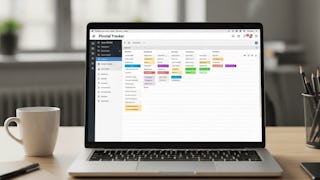This course provides a complete, practice-oriented journey through Agile principles, frameworks, and implementation techniques, equipping learners to apply, analyze, and evaluate Agile methods in real-world projects.



Agile Practices: Apply, Evaluate & Optimize from Mindset
This course is part of Agile Tools & PMI-ACP Exam Prep: Plan, Execute and Lead Specialization

Instructor: EDUCBA
Access provided by PKO BP
Skills you'll gain
Details to know

Add to your LinkedIn profile
14 assignments
September 2025
See how employees at top companies are mastering in-demand skills

Build your subject-matter expertise
- Learn new concepts from industry experts
- Gain a foundational understanding of a subject or tool
- Develop job-relevant skills with hands-on projects
- Earn a shareable career certificate

There are 4 modules in this course
This module introduces learners to the foundational concepts, principles, and frameworks of Agile. It explores Agile values, the 12 principles, and how teams collaborate effectively to deliver customer value in dynamic environments. The module also provides a comprehensive understanding of Scrum fundamentals, including roles, events, and practices, and emphasizes the importance of cross-functional, self-organizing teams. By the end of the module, learners will be equipped with the essential knowledge to understand Agile philosophy and apply Scrum practices effectively in real-world projects.
What's included
11 videos3 assignments
This module provides a practical exploration of Scrum in real-world scenarios, focusing on the events, artifacts, and practices that drive successful Agile delivery. Learners will examine each Scrum event, including Sprint Reviews, Daily Scrums, Retrospectives, and other Sprint meetings, to understand their purpose, timing, and outcomes. The module also delves into the concept of Increments, and the creation and management of User Stories, Epics, and Themes, ensuring learners can craft effective backlog items. By the end of the module, participants will be able to apply Scrum practices to facilitate transparency, inspect progress, and adapt product development effectively.
What's included
15 videos4 assignments
This module introduces learners to the core concepts, methods, and practices of estimation within Agile frameworks. It covers the importance of estimation in planning and prioritization, introduces units like Ideal Days and Story Points, and explains how effort and size are assessed. Learners will explore collaborative estimation techniques such as Planning Poker and understand when and why re-estimation is necessary. By the end of the module, learners will be able to apply consistent, team-driven estimation strategies to support iterative planning and delivery in Agile environments.
What's included
10 videos3 assignments
This module explores how Agile teams make strategic decisions about what to build and when through prioritization and structured planning techniques. It introduces risk- and value-based prioritization models, including the Kano model and financial methods like NPV, IRR, and Payback. Learners will also explore the concept of Minimum Marketable Features (MMFs), the importance of last-minute planning, and timeboxing as a discipline for staying focused and productive. By the end of this module, learners will be equipped to prioritize backlog items effectively and use planning tools to guide Agile delivery.
What's included
12 videos4 assignments
Earn a career certificate
Add this credential to your LinkedIn profile, resume, or CV. Share it on social media and in your performance review.
Why people choose Coursera for their career









